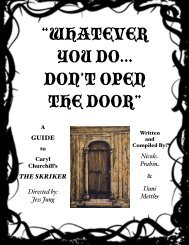Create successful ePaper yourself
Turn your PDF publications into a flip-book with our unique Google optimized e-Paper software.
<strong>Cabaret</strong>: Production History<br />
1966 – Hal Prince Original Production<br />
1967- National Tour<br />
1968 – London Production (Judi Dench as Sally Bowles)<br />
“<strong>Cabaret</strong> is often cited as one of the first major 'concept musicals', where the direction, design and<br />
symbolism of the piece can be just as important as the plot. The images evoked of decadent Berlin and the<br />
ways in which it bows to the rise of Nazism are powerful and disturbing, able to affect multiple generations<br />
of theatre-goers. The piece was conceived by producer-director Hal Prince, who worked closely with<br />
librettist Joe Masteroff, composer John Kander and lyricist Fred Ebb to shape both the general outline and<br />
the specific details of the show. The show opened on Broadway on 20 November, 1966, where the<br />
opening-night cast included Joel Grey, Jill Haworth and Lotte Lenya. The production ran for 1,165<br />
performances and won 8 Tony Awards. A subsequent London production included Judi Dench, Peter<br />
Sallis and Barry Dennen in the cast. It opened on 28 February, 1968 and ran for 336<br />
performances” (BBC).<br />
1972 – Film Production (Liza Minelli as Sally Bowles)<br />
1986 – London Revival<br />
1998 – Mendes’s Broadway Revival (Alan Cummings as the Emcee, Natasha Richardson as Sally)<br />
“The thrusting, angular Bob Fosse moves that are so inextricably associated with “<strong>Cabaret</strong>” lent an<br />
atmosphere of dancing on the edge of a volcano. This time around (Mendes’s 1998 Broadway Revival), the<br />
volcano has caused chaos even before it fully erupts; the dancers look wounded, their stockings are ripped,<br />
and they seem eager not to entertain but simply to survive. The fact that they all have imperfect bodies (clad<br />
in dingy underwear) makes it even harder for us to distance ourselves from their fate; they’re not that<br />
different from us. “<br />
-Nancy Franklin (The New Yorker)<br />
“Mendes’ <strong>Cabaret</strong> could, I suppose, be described as a betrayal of what Prince and the show’s creators—<br />
librettist Joe Masteroff, composer John Kander, lyricist Fred Ebb—had in mind. The original made a very<br />
careful demarcation between the real world of the two central romantic plots and the limbo world of the<br />
Emcee, interrupting the traditionally-styled book scenes and songs with numbers that functioned as<br />
commentary on what surrounded them. For this reason, the original <strong>Cabaret</strong> was a show that<br />
simultaneously looked back and ahead, one that made tantalizing shifts from the ‘40s to ‘60s mode of<br />
conventional musicals to that of the conceptual musical that Prince would go on to champion and triumph<br />
with in the next decade...The new <strong>Cabaret</strong> mixes the two worlds right from the beginning; the Emcee is<br />
allowed to disturb the real world throughout, and the real characters are drawn into the stage show. “<br />
-Ken Mandelbaum (Playbill)<br />
“George Grosz once said of his art, “I felt the ground shaking beneath my feet, and the shaking was visible<br />
in my work.” The same might be said of the work of Cummings and Mendes in their dazzling reinvention<br />
of “<strong>Cabaret</strong>”—the difference is that they make it impossible for the audience not to feel that shaking, too.”<br />
-Michiko Kakutani (The New York Times)<br />
“Theatre is not about illustrating, not about decorating. It’s about building images from the inside out. It’s<br />
become a cliché, you can’t act the beginning of Nazism with a knowledge of the ending. The point (of<br />
<strong>Cabaret</strong>) is to show how seductive it was, to draw the audience in.”<br />
-Sam Mendes (Director)<br />
“The carnal, gyrating chorus of men and women look ill and spent, like denizens in an S-and-M bar who<br />
have already let the games go on too long.”<br />
-Ben Brantley (The New York Times)<br />
1999- National Tour<br />
2006 – London Revival<br />
23



